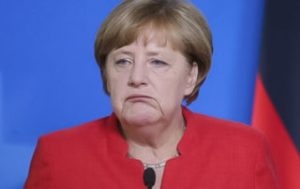
Tuesday, September 19, 2017
Moaning Merkel – The Normal between the Chaos
تم إعداد هذا المنشور من قبل سنشري للاستشارات

The electoral outcomes in last few months prove that voters have prepared themselves for the radical change. From Brexit to Donald Trump to the rise of Emmanuel Macron in the French elections, let us say the electoral menu wants something different on the table. It doesn’t seem that anyone cares about the taste anymore. The German Elections on 24th September will be pivotal as Chancellor Angela Merkel leads the polls by 15 to 20 points.
The bets of Merkel losing in Bundestag are as low as Trump tweeting “I Love Mexico”. However, similar odds were seen during Brexit and Trumpleton so excuse me for highlighting, what is at stake here. Angela Merkel rules the Christian Democratic Union (CDU) and its Bavarian sister concern Christian Social Union (CSU). In 2013, Merkel succeeded to form a coalition with Social Democratic Party (SPD) chief Martin Schulz who has updated his Facebook status to “It’s Complicated” with Merkel. According to Schulz, the left- wing parties should unite to push the rising right- wings.
This breakup means Merkel has to look for other smaller parties to form an alliance to rule another four years. Before I tell you which couple will be the best in the prom, let me run you through the six parties which will be dancing at the Bundestag.
As easier it looks for Merkel to find a partner in crime, the electorates have some anxieties. We have seen the growth of Euro-skepticism during the elections in Netherland, France, and Austria. So far the results of the European elections have been market friendly.
Which Coalitions are to be formed most likely?
The German economy is prospering and the unemployment rate is the second lowest in the EU. This is the first election since 2015 when Merkel opened the gates to around 900,000 migrants from Syria. In last three years, out of 2million jobs available to people, the locals have got only 400,000 and rest 1.6 Million has gone to the new immigrants.
Merkel’s stance on Crimea annexation by Russia is criticized by the Martin Schulz of SPD, pushing for better relations with Moscow. He also supports lifting international sanctions on Russia. Paddling with him are parties like Die Linke and AfD who have opposed the Merkel but for different reasons.
In this case, the coalition of CDU with FDP is most likely. However, FDP has its own disagreements with Merkel on EU integration. Martin Schulz, on the other hand, will most likely to form an alliance with Greens and FDP (traffic combination of Red, Yellow and Green).
Effect on Markets
While Sunday will be a couch comfortable voting day, Monday morning will be the new dawn for Germany. Euro has rallied 13% this year and this will definitely hurt the exports. Fed is getting all eyes on its historic move of reducing the balance sheet this Wednesday.
Draghinator is ready to put the bazooka aside which can make Euro rally more than ever. Under such circumstances, a Merkel win will be the only boring and normal thing which will keep the European equities ticking. DAX has gained 9% this year, France CAC 40 around 7% and UK FTSE100 around 3%. Italy FTSEMIB40, however, rebounded 16% this year.
If Merkel loses or forms a lumping alliance, then the European stocks might take a dive and Germany will see a chaotic government on Monday Morning.
“It looks pretty obvious that Merkel is leading the polls but this will still keep investors on the edge because the rise of anti-euro populism and voters inclination towards an adventurous outcome will increase volatility”, says Devesh Mamtani, chief strategist at Century Financial Brokers.













